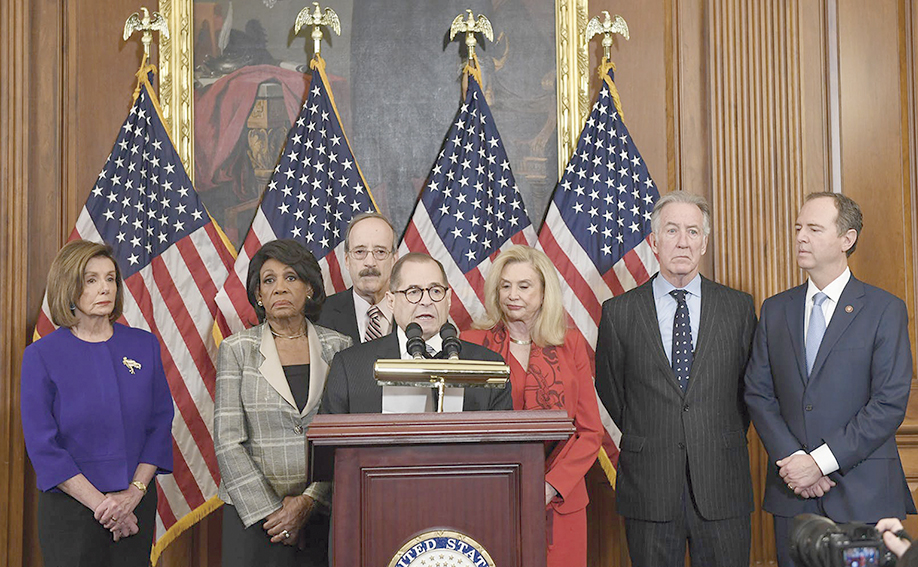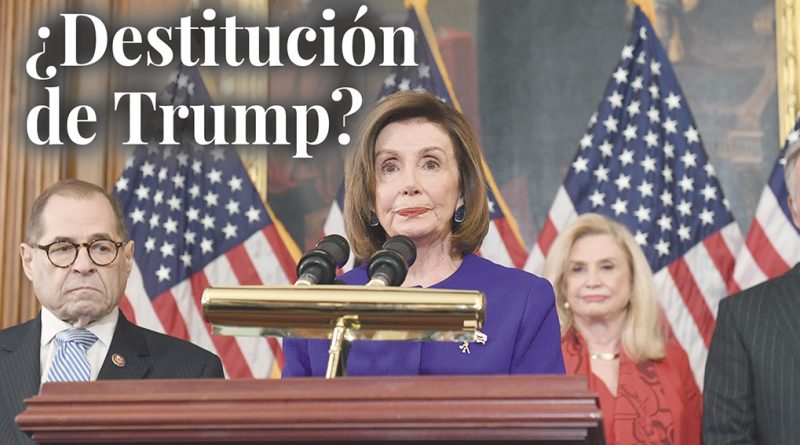Trump’s impeachment nightmare becomes reality
Por William R. Wynn | TULSA, OK
Por tercera vez en la historia de Estados Unidos, un presidente se dirige a la destitución, pero, como en cada una de las otras destituciones, es casi seguro que la destitución del cargo no será el resultado final.
El martes por la mañana, 10 de diciembre, la presidenta de la cámara de representantes, Nancy Pelosi y Jerrold Nadler, presidente del comité judicial, anunciaron dos artículos de acusación contra el presidente Donald Trump, diciendo que el congreso no tuvo más remedio que responder al abuso ilegal del presidente.
Los dos artículos de juicio político contra Trump son el abuso de poder y la obstrucción del congreso, los cuales, según los demócratas, son ejemplos principales de los “altos crímenes y delitos menores” que establece la constitución de los Estados Unidos como razones por las cuales un presidente puede ser destituido de su cargo.
“Es un delito impecable que el presidente ejerza los poderes de su cargo público para obtener un beneficio personal inapropiado mientras ignora o daña el interés nacional”, dijo Nadler sombríamente, explicando el primer artículo de juicio político, abuso de poder. “Eso es exactamente lo que hizo el presidente Trump cuando solicitó y presionó a Ucrania para que interfiriera en nuestras elecciones presidenciales de 2020”.
Nadler dijo que Trump luego ordenó a la actual y anterior Casa Blanca y otros funcionarios del gobierno que no cumplan con las citaciones del congreso mientras se desarrollaba la investigación sobre el asunto de Ucrania, y se negó a entregar documentos. Esto forma la base del segundo artículo de juicio político, obstrucción del congreso.
Trump respondió en su método habitual, a través de Twitter, insistiendo en que “no ha hecho nada mal”, y calificó los procedimientos en su contra como una “cacería de brujas” y una “locura política”.
Trump “utilizó los poderes de la presidencia de una manera que comprometió la seguridad nacional de los Estados Unidos y minó la integridad del proceso democrático de los Estados Unidos”, según los artículos oficiales del estado de destitución, citando el comportamiento corrupto seguido de la obstrucción del congreso de una manera sin precedentes “en la historia de la república”.
“Nadie, ni siquiera el presidente, está por encima de la ley”, dijo Nadler.
Los artículos de juicio político serán debatidos por el comité judicial de la cámara, que preside Nadler, antes de dirigirse a la votación completa de la cámara, que seguramente aprobará los artículos y recomendará que el presidente sea destituido. Sin embargo, el juicio se llevará a cabo en el senado, que está controlado por los aliados republicanos de Trump. Incluso si algunos senadores republicanos votan en contra del presidente, es muy poco probable que se cruce lo suficiente como para formar la mayoría de dos tercios necesaria para que prevalezca la acusación.
Históricamente, ningún presidente ha sido destituido de su cargo, aunque dos fueron acusados por la casa. Andrew Johnson fue acusado en 1868 y Bill Clinton en 1998, pero ninguno fue condenado por el senado.
Queda por ver qué impacto tendrá la acusación de Trump y la presunta absolución del senado en las elecciones de 2020. (La semana)

Trump’s impeachment nightmare becomes reality
By William R. Wynn | TULSA, OK
For only the third time in U.S. history a president is headed for impeachment, but, as in each of the other impeachments, it is almost certain that removal from office will not be the final outcome.
On Tuesday Morning December 10, Speaker of the House Nancy Pelosi and Jerrold Nadler, Chair of the Judiciary Committee, announced two Articles of Impeachment against President Donald Trump, saying that congress had been left with no choice but to respond to the president’s illegal abuse of his office.
The two articles of impeachment leveled against Trump are abuse of power and obstruction of Congress, both of which, Democrats say, are prime examples of the “high crimes and misdemeanors” the U.S. Constitution states as reasons a president may be removed from office.
“It is an impeachable offense for the president to exercise the powers of his public office to obtain an improper personal benefit while ignoring or injuring the national interest,” Nadler said somberly, explaining the first article of impeachment, abuse of power. “That is exactly what President Trump did when he solicited and pressured Ukraine to interfere in our 2020 presidential election.”
Nadler said Trump then ordered current and former White House and other government officials not to comply with congressional subpoenas as the investigation into the Ukraine matter unfolded, and refused to turn over documents. This forms the basis of the second article of impeachment, obstruction of Congress.
Trump responded in his usual method, via Twitter, insisting he “has done NOTHING wrong,” and calling the proceedings against him a “witch hunt” and “Political Madness.”
Trump “used the powers of the presidency in a manner that compromised the national security of the United States and undermined the integrity of the United States democratic process,” the official articles of impeachment state, citing corrupt behavior followed by obstruction of congress in a manner unprecedented “in the history of the republic.”
“No one, not even the president, is above the law,” Nadler said.
The articles of impeachment will be debated by the House Judiciary Committee, which Nadler chairs, before heading to full vote of the House, which is all but certain to approve the articles and recommend the president be removed from office. However, the trial will be held in the Senate, which is controlled by Trump’s Republican allies. Even if some GOP senators vote against the president, it is highly unlikely that enough will cross over to make up the two thirds majority necessary for impeachment to prevail.
Historically, no president has been removed from office although two were impeached by the house. Andrew Johnson was impeached in 1868 and Bill Clinton in 1998, but neither were ultimately convicted by the senate.
What impact Trump’s impeachment and presumed senate acquittal will have on the 2020 elections remains to be seen. (La Semana)


 (1) (2).jpg)


Debe estar conectado para enviar un comentario.